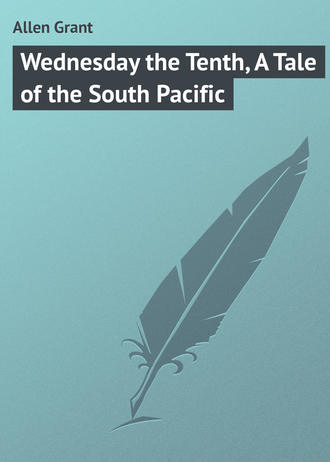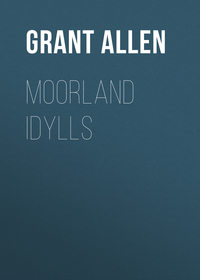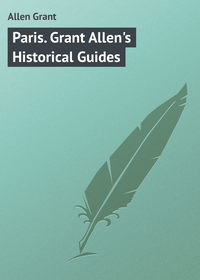 полная версия
полная версияWednesday the Tenth, A Tale of the South Pacific
"Where's Tanaki, Tom Blake?" I asked, turning round, for Tom had been navigating the South Seas any time this twenty years, and knew almost every nook and corner of the wide Pacific, from Yokohama to Valparaiso.
Tom shifted his quid from one cheek to the other and answered, after a pause, "Dunno, sir, I'm sure. Never heerd tell of Tanaki in all my born days; an' yet I sorter fancied, too, I knowed the islands."
"There are no signs of blood or fighting in the boat," I said, examining it close. "They can't have escaped from a massacre, anyhow." For I remembered at once to what perils the missionaries are often exposed in these remote islands – how good Bishop Patteson had been murdered at Santa Cruz, and how the natives had broken the heads of Mason and Wood at Erromanga not so many months back, in cold blood, out of pure lust of slaughter.
"But they must have run away in an awful hurry," Tom Blake added, overhauling the locker of the boat, "for, see, she ain't found; there ain't no signs of food or anything to hold it nowheres, sir; and this ere little can must 'a' been the o'ny thing they had with 'em for water."
He was quite right. The boat had clearly put to sea unprovisioned. It deepened our horror at the poor lads' plight to think of this further aggravation of their incredible sufferings. For days they must have tossed in hunger and thirst on the great deep. But we could only wait to have the mystery cleared up when the lads were well enough to explain to us what had happened. Meanwhile we could but look and wonder in silence; and indeed we had quite enough to do for the present in endeavoring to restore them to a state of consciousness.
"Any marks on their clothes?" my brother Jim suggested, with practical good sense, looking up from his charge as we rowed back toward the Albatross, with the Messenger of Peace in tow behind us. "That might help us to guess who they are, and where they hail from."
I looked close at the belt of the lads' blue shirts. On the elder's I read in a woman's handwriting, "Martin Luther Macglashin, 6, '87." The younger boy's bore in the same hand the corresponding inscription, "John Knox Macglashin, 6, '86." It somehow deepened the tragedy of the situation to come upon those simple domestic reminiscences at such a moment.
"Sons of a Scotch missionary, apparently," I said, as I read them out. "If only we could find where their father was at work, we might manage to get some clue to this mystery."
"We can look him up," Jim answered, "when we get to Fiji."
We rowed back in silence the rest of the way to the Albatross, lifted the poor boys tenderly on board, and laid them down to rest on our own bunks in the cabin. Serang-Palo, our Malay cook, made haste at the galleys to dress them a little arrowroot with condensed milk; and before half an hour the younger boy was sitting up in Jim's arms with his eyes and mouth wide open, craving eagerly for the nice warm mess we were obliged to dole out to his enfeebled stomach in sparing spoonfuls, and with a trifle of color already returning to his pale cheeks. He was too ill to speak yet – his brother indeed lay even now insensible on the bunk in the corner – but as soon as he had finished the small pittance of arrowroot which alone we thought it prudent to let him swallow at present, he mustered up just strength enough to gasp out a few words of solemn importance in a very hollow voice. We bent over him to listen. They were broken words we caught, half rambling as in delirium, but we heard them distinctly —
"Steer for Makilolo … Island of Tanaki … Wednesday the tenth … Natives will murder them … My mother – my father – Calvin – and Miriam."
Then it was evident he could not say another word. He sank back on the pillow breathless and exhausted. The color faded from his cheek once more as he fell into his place. I poured another spoonful of brandy down his parched throat. In three minutes more he was sleeping peacefully, with long even breath, like one who hadn't slept for nights before on the tossing ocean.
I looked at Jim and bit my lips hard. "This is indeed a fix," I cried, utterly nonplussed. "Where on earth, I should like to know, is this island of Tanaki!"
"Don't know," said Jim. "But wherever it is, we've got to get there."
CHAPTER III.
THE MYSTERY SOLVED
We paused for a while, and looked at one another's faces blankly.
"Suppose," Jim suggested at last, "we get out the charts and see if such a place as Tanaki is marked upon them anywhere."
"Right you are," says I. "Overhaul your maps, and when found, make a note of."
Well, we did overhaul them for an hour at a stretch, and searched them thoroughly, inch by inch, Jim taking one sheet of the Admiralty chart for the South Pacific, and I the other; but never a name could we find remotely resembling the sound or look of Tanaki. Tom Blake, too, was positive, as he put it himself, that "there weren't no such name, not in the whole thunderin' Pacific, nowheres." So after long and patient search we gave up the quest, and determined to wait for further particulars till the boys had recovered enough to tell us their strange story.
Meanwhile, it was clear we must steer somewhere. We couldn't go beating wildly up and down the Pacific, on the hunt for a possibly non-existent Tanaki, allowing the Albatross to drift at her own sweet will wherever she liked, pending the boys' restoration to speech and health. So the question arose what direction we should steer in. Jim solved that problem as easy as if it had come out of the first book of Euclid (he was always a mathematician, Jim was, while for my part, when I was a little chap at school, the asses' bridge at an early stage effectually blocked my further progress. I could never get over it, even with the persuasive aid of what Dr. Slasher used politely to call his vis a tergo.)
"They're too weak to row far, these lads," Jim said in his didactic way – ought to have been a schoolmaster or a public demonstrator, Jim: such a head for proving things! "Therefore they must mostly have been drifting before the wind ever since they started. Now, wind for the last fortnight's been steadily nor'east" – the anti-trade was blowing. "Therefore, they must have come from the nor'east, I take it; and if we steer clean in the face of the wind, we're bound sooner or later to arrive at Tanaki."
"Jim," said I, admiring him, like, "you're really a wonderful chap. You do put your finger down so pat on things! Steer to the nor'-east it is, of course. But I wonder how far off Tanaki lies, and what chance we've got of reaching there by Wednesday the tenth?" For though we didn't even know yet who the people were who were threatened with massacre at this supposed Tanaki, we couldn't let them have their throats cut in cold blood without at least an attempt to arrive there in time to prevent it.
Of course, we knew with our one brass gun we should be more than a match for any Melanesian islanders we were likely to meet with, if once we could get there; but the trouble was, should we reach in time to forestall the massacre?
By Wednesday the tenth we must reach Tanaki – wherever that might be.
Jim took out a piece of paper and totted up a few figures carelessly on the back. "We've plenty of coal," he said, "and I reckon we can make nine knots an hour, if it comes to a push, even against this head wind. To-day's the sixth; that gives us four clear days still to the good. At nine knots, we can do a run of two hundred and thirty-six knots a day. Four two-hundred-and-thirty-sixes is nine hundred and forty-four, isn't it? Let me see; four sixes is twenty-four; put down four and carry two: four three's is twelve, and two's fourteen: four two's – yes, that's all right: nine hundred and forty-four, you see, ex-actly. Well, then, look here, Julian: unless Tanaki's further off than nine hundred and forty-four nautical miles – which isn't likely – we ought to get there by twelve o'clock on Wednesday at latest. Nine hundred and forty-four miles is an awful long stretch for two boys to come in an open boat. I don't expect these boys can have done as much as that or anything like it."
"Wind and current were with them," I objected, "and she was drifting like one o'clock when we first sighted her. I shouldn't be surprised if she was making five or six knots an hour before half a gale all through that hard blow. And the poor boys look as if they might have been out a week or more. Still, it isn't likely they would have come nine hundred knots, as you say, or anything like it. If we put on all steam, we ought to arrive in time to save their father and mother. Anyhow we'll try it." And I shouted down the speaking tube, "Hi, you there, engineer! – pile on the coal hard and make her travel. We want all the speed we can get out of the Albatross for the next three days."
"All square, sir," says Jenkins; and he piled on, accordingly.
So we steamed ahead as hard as we could go, in the direction where we expected to find Tanaki.
Half an hour later, Nassaline, who had been down below with the Malay cook and one of the men, looking after the patients, came up on deck once more, with a broad grin on his jet-black face from ear to ear, and exclaimed in his very best Kanaka-English, "Boy come round again. Eat plenty arrowroot. Eat allee samee like as if starvee. Call very hard for see Massa Captain."
"What do you think's the matter with them, Nassaline?" I asked, as I walked along by his side towards the companion-ladder.
Nassaline's ideas were exclusively confined to a certain fixed and narrow Polynesian circle. "Tink him fader go sell him for laborer to a man oui-oui, or make oven hot for him," he answered, grinning; "so him run away, and come put himself aboard Massa Captain ship; so eat plenty – no beat, no starvee."
It was his own personal history put in brief, and he fitted it at once as the only possible explanation to these other poor fugitives.
"Nonsense!" I said, with a compassionate smile at his innocence. "White people don't sell or eat their children, stupid! It's my belief, Nassaline, we'll never make a civilized Christian creature of you, in a tall hat, and with a glass in your eye. You ain't cut out for it, somehow. How many times have I explained to you, boy, that Christians never cook and eat their enemies?.. They only love them, and blow them up with Gatlings or Armstrongs – a purely fraternal method of expressing slight differences of international opinion… Now, come along down and let's see these lads. It's some of your heathen relations, I expect, the poor fellows are flying from."
But I omitted to have remarked to him (as I might have done) that I hadn't seen such a painful sight before, since I saw the inhabitants of a French village in Lorraine – old men, young girls, and mothers with babies pressed against their breasts – flying, pell-mell, before the sudden onslaught of a hundred and fifty Christian Prussian Uhlans. These little peculiarities of our advanced civilization are best not mentioned to the heathen Polynesian.
In the cabin we found both boys now fairly on the high-road to recovery, though still, of course, much too weak to talk; but bursting over, for all that, with eagerness to tell us their whole eventful history. For my own part, I, too, was all eagerness to hear it; but anxiety for their safety made me restrain my impatience. The elder boy, now leaning on his elbow and staring wildly before him with horror – a mere skeleton to look at, with his sunken cheeks and great hollow eyes – began to break forth upon me with his long tale in full; but I soon put a stop to that, you may be pretty sure, with most uncompromising promptitude. "My dear Mr. Martin Luther Macglashin," I said severely, giving him the full benefit of all his own various high-sounding names for greater impressiveness, "if you don't lean back this moment upon your pillow, quiet your rolling eye down to everyday proportions, and answer only in the shortest possible words nothing but the plain questions I put to you, hang me, sir, if I don't turn you and John Knox adrift again upon the wild waves, and continue on my course for Levuka in Fiji."
"Why, how did you come to know our names?" he exclaimed, astonished. "You must be as sharp as a lynx, Captain."
"That's not an answer to my question I asked you," I replied with as much sternness as I could put into my voice, looking at the poor fellow's starved white face. "But as a special favor to a deserving fellow-creature, I don't mind telling you. I'm as sharp as a lynx, as you say, and a trifle sharper: for no lynx would have looked for your names on the flap of your shirts – There, that'll do now; don't try to talk; just answer me quietly. Where do you come from, and where do you want us to go to?"
Martin lifted up his face and answered with becoming brevity, "Tanaki."
"That's better!" I said. "That's the sort of way a fellow ought to answer, when he's more than half-starved with a week at sea. But the next thing is, where's Tanaki?"
"It's one of the group that used to be called the Duke of Cumberland's Islands," the boy answered faintly, yet overflowing with eagerness. "They lie just beyond the Ellice Archipelago, nearly on the line of a hundred and eighty, as you go towards the Union Group along the parallel of"…
"Now, my dear boy," I said, "if you run on like that, as I said before, I shall have to turn you adrift again in your open boat at the mercy of the ocean. Do be quiet, won't you, and let me look up your island?"
"We can't be quiet," Master John Knox put in eagerly, "when we know they're going to murder our father and mother and Calvin and Miriam, on Wednesday morning."
"Just you hold your tongue, sir," I said, pushing him down again on his bunk, "and wait till you're spoken to. Now, not another word, either of you, till I've consulted my chart. Jim, hand down the Admiralty sheets again, there's a good fellow, will you?"
Jim handed them down, and we commenced our scrutiny at once. We soon found the Duke of Cumberland's Islands, and as good luck would have it, found we were steering as straight as an arrow for them. The direction of the wind had not misled us. But no such place as Tanaki could we still find anywhere.
"It used to be called 'The Long Reef,'" Martin said, looking up; "but now we call it by the native name, Tanaki."
"Oh! The Long Reef," I said; "why didn't you say so at first? I know that well enough by sight on the chart; but I never heard it called Tanaki before. That accounts, of course, for the milk in the cocoa-nut. Jim, hand along the calipers here, and let's measure out the course. Two – four – six – eight," I went on, looping along line of sailing with the calipers. "A trifle short of eight hundred miles. Say seven hundred and eighty. And we have till Wednesday morning. Well, we ought to do it."
"You'll be in time to save them, then!" the elder boy cried, jumping up once more like a Jack-in-the-box. "You'll be in time to save them!"
"Will you be quiet, if you please?" I said, poking him down again flat, and holding my hand on his mouth. "O, yes! I expect we'll be in time to save them. If only you'll let us alone, and not make such a noise. We can do nine knots an hour easy, under all steam; and that ought to bring us up to Tanaki, as you call it, by Wednesday morning in the very small hours. Let's see, we've got four clear days to do it in."
"Five," the boy answered. "Five. To-day's Friday."
"No, no," I replied curtly. "Will you please shut up? Especially when you only darken counsel with many words. You're out of your reckoning. To-day's Saturday, I tell you."
And in point of fact, indeed, it really was Saturday.
"No, it's Friday," Martin went on with extraordinary persistence.
"Saturday," I repeated. "Knife; scissors: knife; scissors."
"But we got away from Tanaki eight days ago," the boy declared strongly with a very earnest face; "and it was Thursday when we left. I kept count of the days and nights all that awful time we were tossing about on the ocean alone, and I'm sure I'm right. To-day's Friday."
"Jim," I said, turning to my brother, "what day of the week do you make it?"
"Why, Saturday, of course," Jim answered with confidence.
I went to the bottom of the companion-ladder and called out aloud where the boy could hear me, "Tom Blake, what day of the week and month is it?"
"Saturday the sixth, sir," Tom called out.
"There, my boy," I said, turning to him, "you see you're mistaken. You've lost count of the time in this awful journey of yours. I expect you were half unconscious the last day and night. But, good heavens, Jim, just to think of what they've done! They've been out nine days and nights in an open boat, almost without food or drink, and they've come all that incredible distance before the high wind. Except with a ripping good breeze behind them they could never have done it."
"For my part," said Jim, looking up from his chart, "I can hardly understand how they ever did it at all. I declare, I call it nothing short of a miracle!"
And so indeed it was: for it seemed as though the wind had drifted them straight ahead from the moment they started in the exact direction where the Albatross was to meet them.
I'm an old seafaring hand by this time, and I may be superstitious, but I see the finger of fate in such a coincidence as that one.
CHAPTER IV.
MARTIN LUTHER'S STORY
For the next two days we went steaming ahead as hard as we could go in a bee-line to the northeastward, in the direction of the Duke of Cumberland's Islands; and it was two days clear before those unfortunate boys, Jack and Martin – for that was what they called one another for short, in spite of their severely theological second names – were in a condition to tell us exactly what had happened, without danger to their shattered nerves and impaired digestions.
When they did manage to speak – both at once, for choice, in their eagerness to get their story out – here's about what their history came to, as we pieced it together, bit by bit, from the things they told us at different times. If I were one of those writing chaps, now, that know how to tell a whole ten years' history, end on end, exactly as it happened, without missing a detail, I'd get it all out for you just as Martin told us; or better still, I'd give it to you in a single connected piece, between inverted commas, as his own words, beginning, "I was born," said he, "in the city of Edinburgh," and so forth, after the regular high-and-dry literary fashion. But how on earth those clever book-making fellows can ever remember a whole long speech, word for word, from beginning to end, I never could make out and never shall, neither. What memories they must have to do it, to be sure! It's my own belief they make it up more than half out of their own heads as they go along, and are perfectly happy if it only just sounds plausible. But anyhow, Martin Luther Macglashin didn't tell us all his story at a single time, or in a connected way; he gave us a bit now and a bit again, with additions from Jack, according as he was able. So being, as I say, no more than a free-and-easy master mariner myself, without skill in literature, I'm not going to try to repeat it all, word for word, to you precisely as it came, but shall just take the liberty of spinning my yarn my own way and letting you have in short the gist and substance of what we gradually got out of our two fugitives.
Well, it seems that Jack and Martin's father was, just as I suspected, a Scotch missionary on the Island of Tanaki. He lived there with another family of missionaries of the same sect, in peace and quiet, as well as with an English merchant of the name of Williams, who traded with the natives for calico, knives, glass beads and tobacco. For a long time things had gone on pretty comfortably in the little settlement; though to be sure the natives did sometimes steal Mr. Macglashin's fowls or threaten to tie Mr. Williams to a cocoa-nut palm and take cock-shots at him with a Snider, out of pure lightness of heart, unless he gave them rum, square gin or brandy. Still, in spite of these playful little eccentricities of the good-humored Kanakas, who will have their joke, murder or no murder, all went as merrily as a wedding bell (as they say in novels) till suddenly one morning a French labor-vessel – I suspect the very one we had intercepted in the act of trying to carry off Nassaline – put into the harbor in search of "apprentices."
She was a very bad lot, from what the boys told us; a genuine slaver of the worst type; and she stirred up a deal of mischief at Makilolo.
On the shore the Chief of Tanaki was drawn up to receive them with all his warriors, tastefully but inexpensively rigged out in a string of blue beads round the neck, an anklet of shells and a head-dress of a single large yellow feather.
"Who are you?" shouts the chief at the top of his voice. "You man a oui-oui?"
"Yes," the Frenchman shouts back in his pigeon-English. "Me de commander of dis French ship. Want to buy boys. Must sell them to us. Tanaki French island. Discovered by Bougainville."
"No, no," says the Chief in pigeon-English again. "Tanaki no belong a man a oui-oui. Tanaki belong a Queenie England. Capitaney Cook find him long time back. My father little fellow then; him see Capitaney, him tell me often. Capitaney Cook no man a oui-oui; him fellow English."
The other natives joined in at once with their loud cry, "Chief speak true. Tanaki belong a Queenie England. Tanaki no belong a man a oui-oui. If man a oui-oui want to take Tanaki, man a Tanaki come out and fight him." And they threw themselves at once into a threatening attitude.
"Have you got any Englishmen here?" the French skipper called out, to make sure of his ground.
"Yes," says the missionary – our boys' father – standing out from the crowd. "Three English families here. Settled on the island. And we deny that this group belongs to the French Republic."
At that the Frenchman pulled back a bit. When he saw there was likely to be opposition, and that his proceedings were watched by three English families, he drew in his horns a little. He knew if he interfered too openly with the missionaries' proceedings, an English gunboat might come along, sooner or later, and overhaul him for fomenting discord on an island known to be under the British protectorate. So he only answered in French, "Well, we're peaceable traders, Monsieur. We don't want to interfere with the British Government. Consider us friends. All we desire is to hire laborers." And he landed his boat's crew before the very face of Macglashin and the Tanaki warriors.
At first, as often happens in these islands, the natives were very little disposed to trade with the strangers in boys or women, for they were afraid of the Frenchmen; and Macglashin and the other missionary did all they knew to prevent the new comers from carrying off any of the islanders into practical slavery. But after awhile the Frenchmen produced their regulation bottles of square gin (that's what they call Hollands in the South Pacific), and began to treat the Chief and the other savages to drinks all round, as much as you liked, with nothing to pay for it. In a very short time the Chief had got so much liquor aboard that his legs wouldn't answer the rudder any longer, and he began to reel about like a perfect madman. Most of the other full-grown men natives followed suit before long, and lay down on the beach half dead with drunkenness. Perhaps the liquor was drugged; perhaps it wasn't; but anyhow, in spite of all the missionaries could do, the shore before nightfall was in a condition of the wildest and most bestial orgies. The men, in what the newspapers call "a high state of vinous exhilaration," were ready to sell their boys and girls, or anything else on earth for a little more gin; and as the missionaries were naturally helpless to prevent it, the Frenchman was soon driving a roaring trade in flesh and blood against the drunken savages.
The business-like way they went to work, Jack and Martin told us, was horribly disgusting. The women, indeed, they tried to wheedle and cajole – "You like go along a New Caledonia along a me? Only three yam times; then ship bring you back again. Very good feed; plenty nyam-nyam. Pay very good. Pay money. Lots of shop. You buy what you like: you buy red dress, red handkerchief, beads like-a-chiefie. No fight; no beat; no swear at you. You good girl; I good fellow master." But if they couldn't induce them, by fair words and promises and little presents of cheap French finery, to put their mark to their sham indentures, then they just knocked them down with a blow on the head, dragged them by their hair to the boats hard by, and got their fathers or husbands to put their marks, and receive a few dollars and some red cloth in payment.









